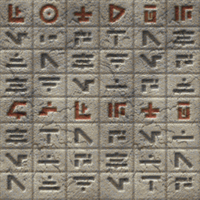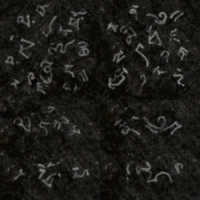- Abah
- Filthy, unclean;[10] also the name of an ancient Yokudan warrior
- Ajcea
- Downward spiral (n.) [6]
- Anka-Ra
- Former warrior, old warrior [11]
- Ansei
- Sword Saint (n.) [12] Shortened variant of the less common term "Hel Ansei"
- Anseilak
- Communion (n.) [13]
- Anselim
- Stop, to cease [2]
- Ansu-Gurleht
- Vehk the Circle Talker [UOL 1]
- Atomos
- the uncuttable (n.) [UOL 1]
|
- Den
- To be, is [14][15]
- Dan
- Have (v.) [14]
- Daibethe
- Sun
- Do
- Of; sometimes also 'at'. Also marks the object of the verb napere 'to find' [14]
- Dogo
- He/she, him/her, his/her [14][15]
- Dongo
- Sister (n.) [15]
- Dua
- You, you, your, you, 'that one of yours' [14]
- Duadra
- Staying (verb in gerund form) [15]
- Dui
- About; meaning 'on the subject of' [14][15]
- Duptra
- Moving, acting restlessly (verb in gerund form) [15]
|
- Elden Yokeda
- Military dictator [12]
|
- Ghraewaj
- "The Crows Who Punish/Were Punished" [1]
- Greklith
- Strong King [16]
- G'ye
- Fabricator [17]
|
- Hadi
- They, them, their [14]
- Hattu
- "The Father of Mountains" [12]
- Hel
- Sword (n.) [18][11]
- Hel Ansei
- Sword Saint [12]
- Hel Anseilak
- "Communion with the Saints of the Sword" [13]
- Hel Shira
- Sword Noble,[18][11] Blade Noble[11]
- Hi
- Difficult (adj.) [14]
- Hi
- Magic (n.) [14]
- Hunding
- The name of the region of High Desert in which Frandar Hunding was born [12]
|
- Johad
- Rainwater Cistern [19]
|
- Kai
- Thought [UOL 2]
- Kogo-hi
- Guild of mages (n.) [14]
- Kol-hadu-ranga
- Lighthouse (n.) [14]
- Koomu Alezer'i
- "We Acknowledge" [13]
- Kotu
- Weapon or Edge [11][20]
|
- Na
- Perhaps, maybe [14]
- Naha [17]
- Napere
- Find (v.); the preposition do 'of' is used before the object; 'napere sa do dongo' literally 'to find here of sister', and means 'here to find [my] sister' [14][15]
- Na-Totambu
- Kings and ruling bodies of Yokuda [4][21]
- Ne
- Against [14]
- Netu
- Turn [2]
- Netu anselim
- Small version of "turn back" [UOL 1]
- No Lo'igra
- Deceiver [17]
- No Shira
- Noble person [12]
- Nogro
- Body, form (n.) [14]
|
- Tang
- Help (n.) [14]
- Tengai
- See (v.) [14]
- Tobr'a
- Useless, evil (adj.) [4]
- Toktra
- Searching for (verb in gerund form) [14]
- Trai [17]
- Trangai
- Farewell [14]
- Tukta
- For what reason, cause (n.) [15]
- Tukta-mab'ro
- Storyteller [17]
|
- Ueetonga
- My son (n.); might be the same as uetonga [14]
- Uetonga
- Son (n.); might be the same as ueetonga [14]
- Ugakta
- Rage, be angry (v.) [14]
- Ugak-ta
- "I'm pretty mad" [UOL 1]
- Ugo-no-
- Far away from; prefixed to the object of being far away from; 'ugo-no-mitana' (far away from the island) [14]
|
SentencesEdit
- Naha 'mei dogo Ra Gada lonhe trai
- "The Forebears know their place."[17]
|
Yokudan HolidaysEdit
Many of the holidays extant in modern Hammerfell are said to be direct translations of older Yokudan festivals before their migration to Hammerfell.[24]
- Aduros Nau: The villages in the Bantha celebrate the baser urges that come with Springtide on Aduros Nau.
- Baranth Do: Celebrated by the Redguards of the Alik'r Desert. Pageants featuring demonic representations of the old year are popular, and revelry to honor the new year is everywhere.
- Chil'a: The blessing of the new year in the barony of Kairou, is both a sacred day and a festival. The archpriest and the baroness each consecrate the ashes of the old year in solemn ceremony, then street parades, balls, and tournaments conclude the event.
- Drigh R'Zimb: Held in the hottest time of year in Abibon-Gora, is a jubilation held for the sun Daibethe itself.
- Ghraewaj: A festival of the graces the gods have granted the people of Lainlyn over the centuries.
- Koomu Alezer'i: A tradition in Sentinel for thousands of years. The people of Sentinel solemnly thank the gods for their bounty, and pray to be worthy of the graces of the gods.
Saban, a Yokudan witchmother who only speaks Yoku
Coyle, Saban's son who translates for her
Box of Shehai Essence, covered in Yokudan runes
ReferencesEdit
- ^ a b c d Ghraewaj — Tidasus
- ^ a b c d The Horse-Folk of Silverhoof — Doctor Nabeth al-Gilane, Khefrem Academy of Yokudan Heritage
- ^ Systres History: Volume 2 — Trilam Heladren, Associate Dean of Eltheric History, University of Gwylim
- ^ a b c d e f Pocket Guide to the Empire, 1st Edition: Hammerfell — Imperial Geographical Society, 2E 864
- ^ Events of Redguard
- ^ a b c The Alik'r — Enric Milres
- ^ Lord of Souls — Greg Keyes
- ^ Lefthander's Aegis Belt antiquity codex entries in ESO: High Isle
- ^ Cries from Empty Mouths — Varederil, Psijic Order
- ^ Members of the Hew's Bane Thieves Guild Answer Your Questions — Walks-Softly, Kari Coin-Counter, Velsa, Zeira, Thrag, Andarri
- ^ a b c d e f g h i j Elenaire's Journal — Elenaire
- ^ a b c d e f g h Redguards, History and Heroes — Destri Melarg
- ^ a b c d Holidays in Daggerfall
- ^ a b c d e f g h i j k l m n o p q r s t u v w x y z aa ab ac ad Saban's dialogue in Redguard
- ^ a b c d e f g h i j k l m Coyle's dialogue in Redguard
- ^ a b Death Certificate in Daggerfall
- ^ a b c d e f g h i The Origin of Cyrus! — Michael Kirkbride
- ^ a b c Hel Shira's Fancy Camel Goad contraband item in ESO
- ^ Moon-Sugar in the March
- ^ a b The Book of Circles: Forging Maxims — Frandar Hunding
- ^ Pocket Guide to the Empire, 3rd Edition: The Ra Gada: Hammerfell — Imperial Geographical Society, 3E 432
- ^ Sacrilege and Mayhem in the Alik'r — Doctor Tazhim of the Bureau of Outlander Affairs
- ^ The Monomyth
- ^ a b Holidays of the Iliac Bay — Theth-i
- ^ Divad the Singer — Destri Melarg
- ^ The Faerie — Szun Triop
Note: The following references are considered to be unofficial sources. They are included to round off this article and may not be authoritative or conclusive.
|


